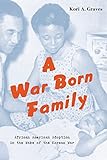A War Born Family : African American Adoption in the Wake of the Korean War / Kori A. Graves.
Material type: TextPublisher: New York, NY : New York University Press, [2020]Copyright date: ©2020Description: 1 online resourceContent type:
TextPublisher: New York, NY : New York University Press, [2020]Copyright date: ©2020Description: 1 online resourceContent type: - 9781479872329
- 9781479891276
- African American families
- African American parents
- Intercountry adoption -- Korea (South) -- History -- 20th century
- Intercountry adoption -- United States -- History -- 20th century
- Interracial adoption -- United States -- History -- 20th century
- Korean War, 1950-1953 -- Children
- Racially mixed children -- Korea (South)
- HISTORY / Asia / Korea
- African American soldiers
- Cold War civil rights
- Foster Care and Adoption Project
- GI children
- Hines Ward Jr
- International Social Service
- Korean War
- Korean black children
- Korean transnational adoption
- Mixed race children
- National Urban League
- Pearl S. Buck Foundation
- Pearl S. Buck
- Post Exchange
- US domestic adoption
- Welcome House
- World War II
- adoption reform
- black press
- child welfare professionals
- civil rights
- gender and racial oppression
- gender hierarchies
- interracial families
- mixed-race Koreans
- proxy adoption
- social welfare
- transnational adoption
- transracial adoption
- 362.734089/05960730957 23
- HV875.64
- online - DeGruyter
| Item type | Current library | Call number | URL | Status | Notes | Barcode | |
|---|---|---|---|---|---|---|---|
 eBook
eBook
|
Biblioteca "Angelicum" Pont. Univ. S.Tommaso d'Aquino Nuvola online | online - DeGruyter (Browse shelf(Opens below)) | Online access | Not for loan (Accesso limitato) | Accesso per gli utenti autorizzati / Access for authorized users | (dgr)9781479891276 |
restricted access online access with authorization star
http://purl.org/coar/access_right/c_16ec
The origins of a transnational adoption strategy that secured the future for Korean-black childrenThe Korean War left hundreds of thousands of children in dire circumstances, but the first large-scale transnational adoption efforts involved the children of American soldiers and Korean women. Korean laws and traditions stipulated that citizenship and status passed from father to child, which made the children of US soldiers legally stateless. Korean-black children faced additional hardships because of Korean beliefs about racial purity, and the segregation that structured African American soldiers' lives in the military and throughout US society. The African American families who tried to adopt Korean-black children also faced and challenged discrimination in the child welfare agencies that arranged adoptions.Drawing on extensive research in black newspapers and magazines, interviews with African American soldiers, and case notes about African American adoptive families, A War Born Family demonstrates how the Cold War and the struggle for civil rights led child welfare agencies to reevaluate African American men and women as suitable adoptive parents, advancing the cause of Korean transnational adoption.
Mode of access: Internet via World Wide Web.
In English.
Description based on online resource; title from PDF title page (publisher's Web site, viewed 01. Nov 2023)


